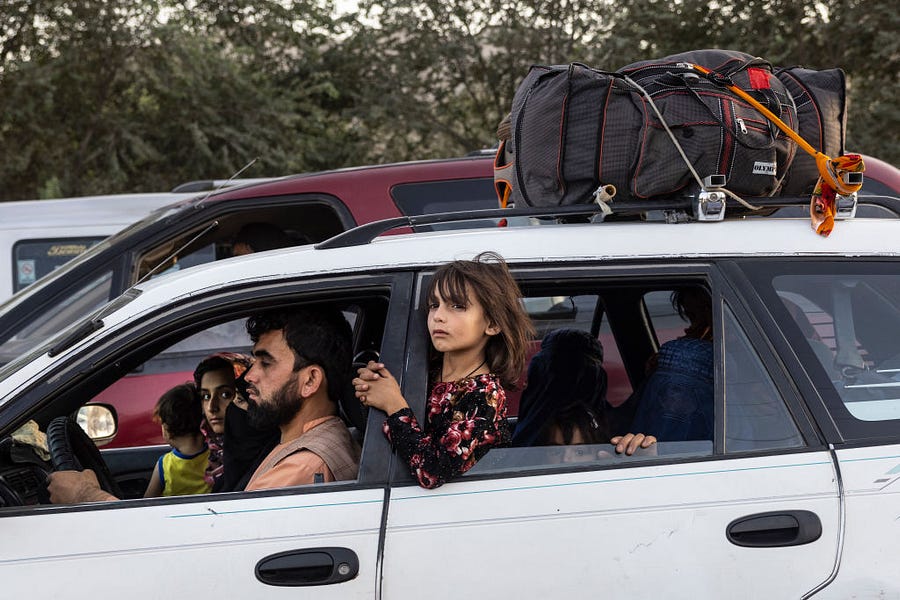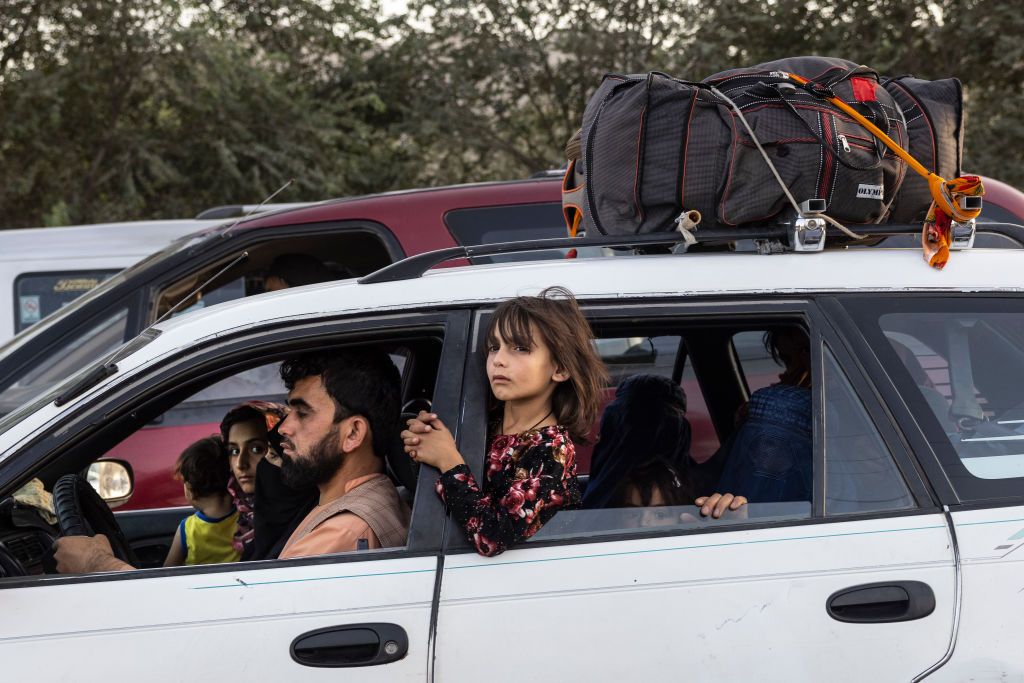Everything That Will Follow A Taliban Victory Is Still A Part of America's War
Many Afghans are likely to suffer under the Taliban. The U.S. owes them reparations, not more bloodshed.


Edited by Sam Thielman
THE U.S.’ TROOP WITHDRAWAL FROM AFGHANISTAN is almost at hand, as is the Taliban’s reconquest.
The Taliban have made eye-opening advances in the country’s northern provinces, which they were never able to subdue before the U.S. invasion. They began the week by overrunning or capturing six capitals in five days. They ended it by taking Herat, Lashkar Gar, and the crucial southern city of Kandahar. Zalmay Khalilzad, the longtime U.S. envoy, flew at the start of the week to Doha, Qatar, where the Taliban maintain a diplomatic office, to see if anything remains of the peace process – and, reportedly, whether the insurgents would be kind enough not to sack the U.S. embassy and cause a combination Saigon/Benghazi moment. “He will press the Taliban to stop their military offensive and to negotiate a political settlement,” the U.S. State Department said in their Monday announcement, “which is the only path to stability and development in Afghanistan.” In essence, Khalilzad is asking the Taliban not to win the war.
Nothing is inevitable. But it’s important to be clear about what an outright Taliban victory will mean: revenge killings, refugees and repression, including gendered repression. I’ve spent no serious time in Afghanistan – two months total out of 20 years, and never did I see the country beyond its Kabul, Khost, Paktia and Parwan provinces – so I don’t want to front like I have an emotional connection to it. That said, I met people in Afghanistan, people who treated me warmly when they didn’t have to, and I’m thinking of them with some dread.
When the U.S. withdraws from a war, the ensuing suffering of innocent people becomes, to the “national security” community, an argument for re-escalation. Think of the Yazidis stranded atop Mount Sinjar and the role that story played in returning the U.S. to war in Iraq. (And buy Samuel Moyn’s forthcoming book Humane for an excellent critical exploration of such issues.) We tend to conceive of this kind of suffering not as the result of the war, but as an alternative to it. That has a certain intuitiveness: you cease fighting in a place and disaster emerges there.
But it’s a mistake to think of the disaster as a departure from the war. Remember that the Taliban offered terms in December 2001. Donald Rumsfeld rejected them. Everything that followed made the Taliban stronger. The idea that continuing the war for a twenty-first year will make the Taliban weaker could only occur to an American Exceptionalism junkie in withdrawal. It’s easier to wish-cast about glorious wars that might have been than to cope with the fact that America’s works were an avoidable disaster that built nothing enduring except human suffering. It is far easier to consider the bloodletting that follows the U.S. presence to be merely the result of its absence. But to take that position is to wash the blood from American hands that waged the war, all the while claiming that the retreat is the contemptible hand-washing.
One of the consequences of waging Forever Wars is that they obscure what it means to lose a war. This is what it means: the Enemy wins. The Enemy’s victory will likely be terrible. Among the reasons it is so terrible is that the United States of America is an accessory to it.
Look at who the United States tries to save and who it doesn’t. The Biden administration is engaged in a valiant effort – one that did not happen during the brief interregnum between Iraq Wars – to resettle Afghans who worked for the U.S. military. It is a baseline obligation and a matter of honor.
It is also a moral floor that functions as a moral ceiling: The U.S. will save only those who lent it a service. It is not throwing open the doors to refugees who didn’t work for the United States. Those refugees are bound for, among other places, Iran, whose government, according to the United Nations refugee agency, “has consistently welcomed Afghans fleeing protracted conflict and violence for over 40 years.” The United States, which has fueled that protracted violence and conflict for over 40 years – first through the CIA-Saudi-Pakistani anti-Soviet coalition; then for the past 20 years’ war – cannot say the same.
WHAT DO WE OWE THE AFGHAN PEOPLE? We owe them a life they can live, resettling them in the United States if they so choose, and we owe them reparations. Reparations is a charged word, and I do not use it here to suggest that reparations for the descendants of the enslaved ought to wait until we pay reparations for the War on Terror. I mean here that throughout history, the losers of wars have had to pay reparations, though typically to the regimes and not people. But it is people whom the U.S. owes, not regimes.
I’ve tweeted versions of this argument on Twitter and I typically encounter versions of the following objection. The rhetoric of U.S. obligation is nothing but a lever for re-escalation.The problem with the Afghanistan war is that we did too much for the Afghans, rather than not enough. We built schools, built an army, built a police force, provided agricultural assistance, and built a central government.
The thing is that the United States didn’t build any of that for the Afghan people. It built it for itself, so as to have a reliable client in Southwest Asia between Iran and Pakistan.
But reparations for Afghanistan’s people, as a material responsibility, is surely a nonstarter for the people who make U.S. foreign policy. Material culpability for destabilizing a population, provided to that population, is a hell of a precedent for a hegemonic power to set. It would come too close to providing the thing hegemonic powers tell themselves they provide and never do: justice.
Far easier to just re-escalate the wars. Already we see the familiar War-on-Terror caveats to the troop pullout in Afghanistan: Afghanistan will be surveilled constantly and bombed as often as the U.S. deems fit. “In CENTCOM, if needed, the USS Ronald Reagan Carrier Strike Group is on station. The package of long-range bombers, additional fighter-bombers and troop formations are postured to quickly respond if necessary and directed,” Gen. Mark Milley, the disgrace who remains the chairman of the Joint Chiefs of Staff, promised last month.
There we see continuity with the war masquerading as departure from it. The war doesn’t end, it continues with caveats attached, lying in wait for its failure to prompt calls for more retributive violence. In that manner the cycle repeats. There is simply no substitute for ending a war and paying the debts that American policymakers did not understand themselves to be accruing. They were accrued regardless.

